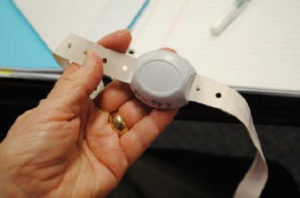
In keeping with his desire to provide service to every citizen, no matter the need, Sheriff Leon Lott researched and obtained information on a great program that could safeguard our “at risk wanderers” within our communities. Sheriff Lott immediately knew this was a program he wanted to bring to our citizens because he saw a way to give some peace of mind to those whom might wander away from their homes and for those who love and care for them.
Funding through our local Pilot Club enabled the Sheriff’s Department to purchase the necessary equipment and get personnel trained and improve the communities awareness to the need for this program. In 2007, Project Lifesaver was introduced to Richland County citizens.
Project Lifesaver was founded in Chesapeake VA in April of 1999. Today, there are 1,300 participating PLS agencies across the USA, Canada, and Australia. Presently in South Carolina, Project Lifesaver agencies are: Richland (state coordinator agency), Aiken/N. Augusta, Horry/Myrtle Beach, Charleston Co, Lee Co, Oconee Co, Chester Co, Cherokee Co, Darlington Co, Orangeburg Co, and Sumter Co.
Project Lifesaver is the only organization that is allowed to electronically track human beings. It was designed to protect our “at risk wanderers” who suffer from Alzheimer’s, children of Autism and those with Down Syndrome and other brain disorders which may lead them to wander. The concept came from King North Carolina at the Stokes County Mountain Rescue where they were providing hikers and campers who entered the State Park a transmitter in case they got lost while on their travels within the park. The Rescue service would collect the transmitters from the guests when they left the park. Project Lifesaver adopted this idea, and with the Federal Government stating Project Lifesaver could electronically track “at risk wanderers”, Project Lifesaver was born.
Today, Project Lifesaver has conducted over 2,900 searches with a 100% recovery rate. A normal search would take Law Enforcement an estimated 9 hours at $2,500 per hour per search and sometimes using hundreds of officers and volunteers. With those costs and time frames, recovery rates were low and agencies were depleting their budgets with these costly searches. With Project Lifesaver, the search time is dramatically decreased to an estimated 30 minutes per search, with using about 10 officers total for the whole operation. RCSD utilizes the ground units which can track by vehicle or on foot and by air with our helicopter. We have approximately 50 trained and certified as electronic search specialist and three deputies trained for the airborne search.
The concept is very easy. A caregiver would call Project Hope, who does our client management, and lets them know they are interested in enrolling their loved one in the program. Project Hope would send out one of their techs and make a home visit. There, the caregiver would receive the paperwork on the program and would be advised of the conditions of the program. If the caregiver/loved one are accepted to the program, they will receive a transmitter for their loved one.
If a client wanders off from their caregiver, the caregiver will call a predetermined number from the program and activate Project Lifesaver. Responding officers will use their training, equipment and knowledge of the program to bring that loved one home.
Richland County Sheriff’s Department does not charge Richland County residents or their loved ones who are “at risk wanderers” to be on the program.
All required paperwork, contracts, doctor exams and follow ups have to be completed before a client is admitted into the program.
If you would like to have more information about this program or you may think this program would benefit your family please contact Lt. Tom Amaro at 803-576-3183 or you may email your request.
